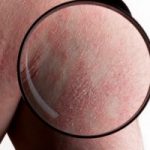August is Psoriasis Awareness Month, so we have compiled some of Bel Marra Health’s top stories on psoriasis in association with gluten-free diet, heart disease, Alzheimer’s disease, menopause, and gum disease.
The exact cause of this autoimmune skin condition is still unknown, but research is underway attempting to uncover the driving mechanisms of psoriasis. Going beyond the simple definition of a skin disorder, psoriasis can be influenced by various life changes, has been found to be more prevalent among gum disease patients, and may have impact on one’s heart health.
 Gluten-free diet may improve psoriasis
Gluten-free diet may improve psoriasis
Advertisement
A gluten-free diet is known to aid in celiac disease, but it may also be able to improve your psoriasis as well. Many psoriasis patients have opted to go gluten-free and have found relief for their psoriasis even though there is little scientific evidence to support this practice. But as more and more psoriasis patients go gluten-free, science is taking a closer look at this trend.
In preliminary studies, researchers examined if psoriasis patients were more likely to have gliadin antibodies. Gliadin is a wheat protein that people who are sensitive to gluten can’t ingest. Some studies revealed psoriasis patients do carry such antibodies, while others did not.
The most notable study on gluten and psoriasis was conducted based on the Nurses’ Health Study, involving questionnaires completed by over 82,000 nurses. The study found that women who drank beers five times a week were more likely to develop psoriasis compared to those who didn’t. You may not think beer has anything to do with gluten, but it contains barley, which triggers gluten sensitivities.
Dr. Jerry Bagel from the National Psoriasis Foundation believes that at least 25 percent of psoriasis patients would benefit from a gluten-free diet, but the Foundation as a whole is still indecisive about recommending a gluten-free diet to psoriasis patients.
Dr. Bagel also pointed out that patients with psoriasis affecting over 30 percent of the body seem to experience greater benefits going gluten-free than those with mild psoriasis. Continue reading…
 Psoriasis skin inflammation treatments improve heart disease symptoms: Study
Psoriasis skin inflammation treatments improve heart disease symptoms: Study
Psoriasis skin inflammation treatments improve heart disease symptoms by blocking the immune system response that causes inflammation. It is estimated that 7.5 million Americans have psoriasis. Although it is a skin condition, the effects of psoriasis run deep. In fact, psoriasis is a known risk factor for heart disease.
Jashin J. Wu, director of dermatology research at the Kaiser Permanente Los Angeles Medical Center, said, “People with psoriasis, particularly those with more severe disease, have an increased risk for a variety of other health problems, including obesity, diabetes, high blood pressure, high cholesterol, stroke, and heart attack. Psoriasis patients, even those with mild disease, need to be aware of how this condition affects their overall health.”
The study suggests that treating psoriasis can help lower patients’ risk of cardiovascular disease by reducing the immune response that triggers inflammation on the skin and elsewhere in the body. Treatments for psoriasis include phototherapy, systemic medications such as acitretin, cyclosporine, and methotrexate, as well as biologics, which block the immune system responses fueling inflammation.
Despite the fact that psoriasis treatment may indeed help reduce the risk of cardiovascular complications, Dr. Wu suggests the link is still unclear and additional research is required to better understand the association between the two conditions. Continue reading…
 Psoriasis drug may help treat Alzheimer’s disease: Study
Psoriasis drug may help treat Alzheimer’s disease: Study
Psoriasis drug may help treat Alzheimer’s disease, according to research findings. The number of people living with dementia is expected to grow exponentially by the year 2050, so there is a pressing need for treatment options for dementia and Alzheimer’s disease. Dementia is one of the most common health problems among the elderly. Researchers at the Department of Psychiatry and Psychotherapy of the University Medical Center of Johannes Gutenberg University Mainz (JGU) have found that Alzheimer’s disease may possibly be treated with a common psoriasis drug, as it activates the enzyme ADAM10 in Alzheimer’s disease patients. The enzyme is capable of suppressing Alzheimer’s disease-related effects, namely, impaired cerebral function.
Although the exact Alzheimer’s trigger is unknown, it is established that activity of certain enzymes does play a role in the onset and development of the disease. The researchers targeted ADAM10 by administering an oral drug commonly used for psoriasis to Alzheimer’s patients. The drug led to elevated levels of the nerve cell-protecting growth factor APPs-alpha in their spinal fluid. This stimulates the activity of ADAM10, which reduces the buildup of amyloid plaques commonly seen in Alzheimer’s disease. ADAM10 has been shown to improve memory and enhance learning capability. Continue reading…
 Psoriasis severity may be influenced by puberty, pregnancy, postpartum, and menopause
Psoriasis severity may be influenced by puberty, pregnancy, postpartum, and menopause
Psoriasis severity may be influenced by puberty, pregnancy, postpartum, and menopause. Female hormones have been found to play a particularly significant role in psoriasis. Psoriasis peaks take place during puberty, after pregnancy (although the condition improves during pregnancy), and during menopause.
One third of psoriasis patients present lesions by puberty. Other studies have noted that psoriasis peaks during puberty and again between the ages of 30 to 50. Higher levels of estrogen during the first menstruation may also play a role in inflammation. The researchers stressed that higher estrogen levels may influence certain immune responses that play a role in inflammatory processes in the body.
On the other hand, female patients experience improvement in their psoriasis when expecting. Pregnancy is associated with relief in psoriasis symptoms thanks to the rising levels of estrogen and the hormone’s anti-inflammatory effect. The researchers found that 55 percent of patients with psoriasis experienced improvement during pregnancy. (After pregnancy, however, the condition got worse in 65 percent.)
The researchers also mention significant or near-significant correlations between psoriatic body surface area and the concentrations of estradiol, estriol, and the estrogen-to-progesterone ratio. They concluded that “high levels of estrogen correlated with an improvement in psoriasis, whereas progesterone levels did not correlate with psoriatic change. Continue reading…
 Psoriasis-affected people face increased risk of gum disease (periodontitis): Study
Psoriasis-affected people face increased risk of gum disease (periodontitis): Study
Psoriasis-affected people face an increased risk of gum disease (periodontitis), according to research. A study conducted in Norway looked at 50 people with moderate to severe psoriasis and compared them to 121 people without the skin condition.
Advertisement
Each participant underwent an oral exam, and the researchers found that periodontitis was more prevalent among those with psoriasis. Furthermore, loss of the alveolar bone – the bone that holds the tooth socket – was more frequent among psoriasis patients as well.
Twenty-four percent of psoriasis patients had moderate to severe gum disease, compared to only 10 percent of the controls. Factors that could contribute to gum disease in psoriasis patients include smoking and irregular dentist check-ups.
Previous studies have also shown a link between psoriasis and gum disease, suggesting that periodontitis may actually make one more likely to develop psoriasis. Continue reading…
